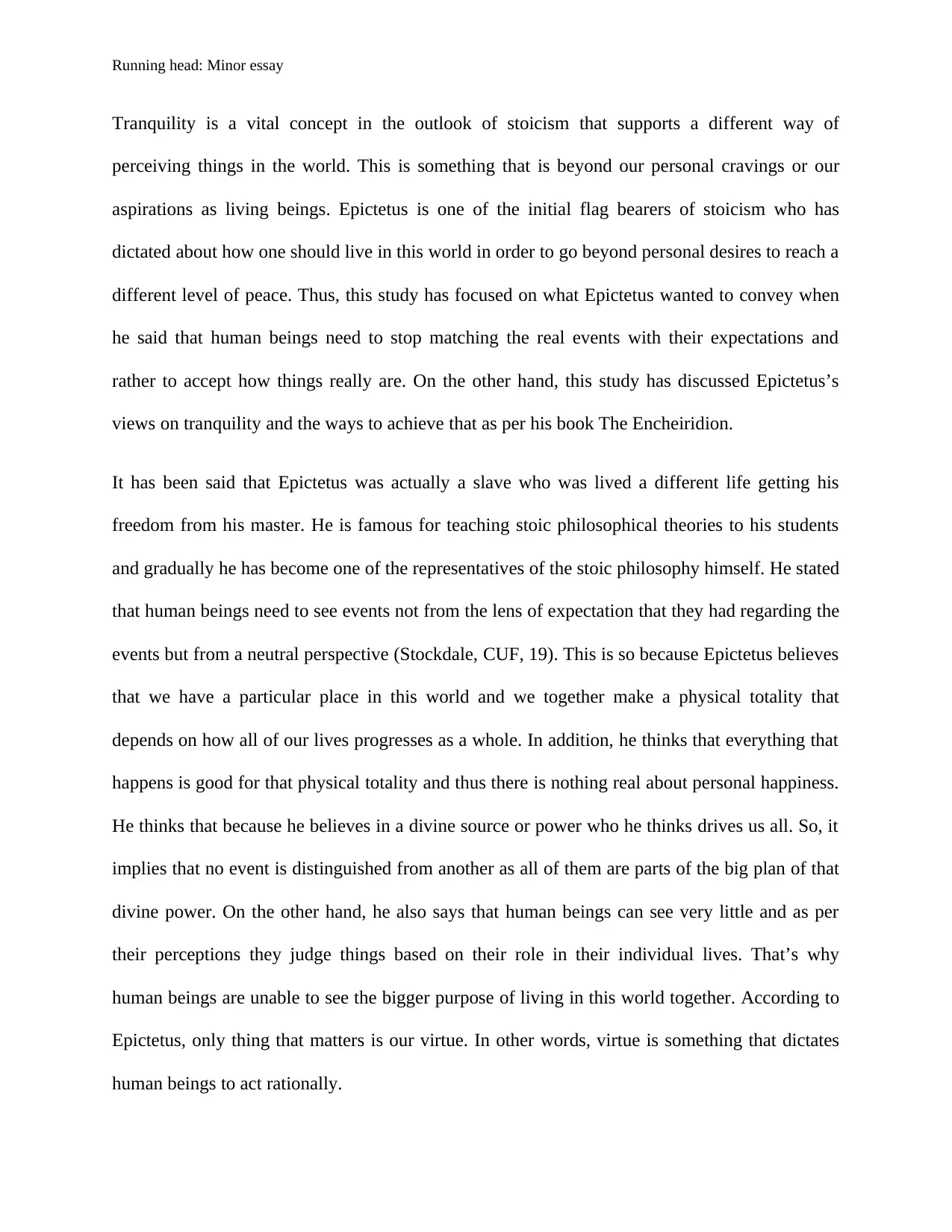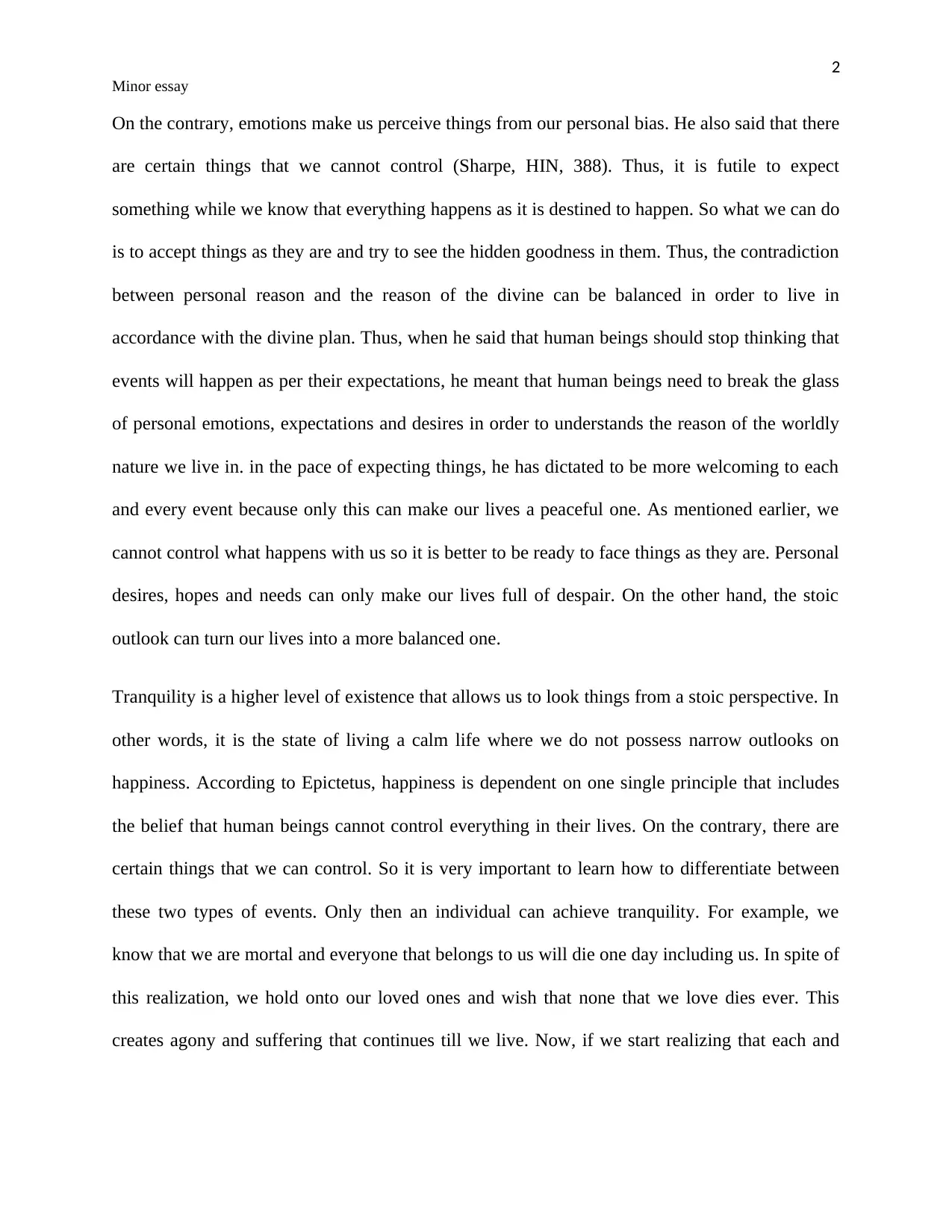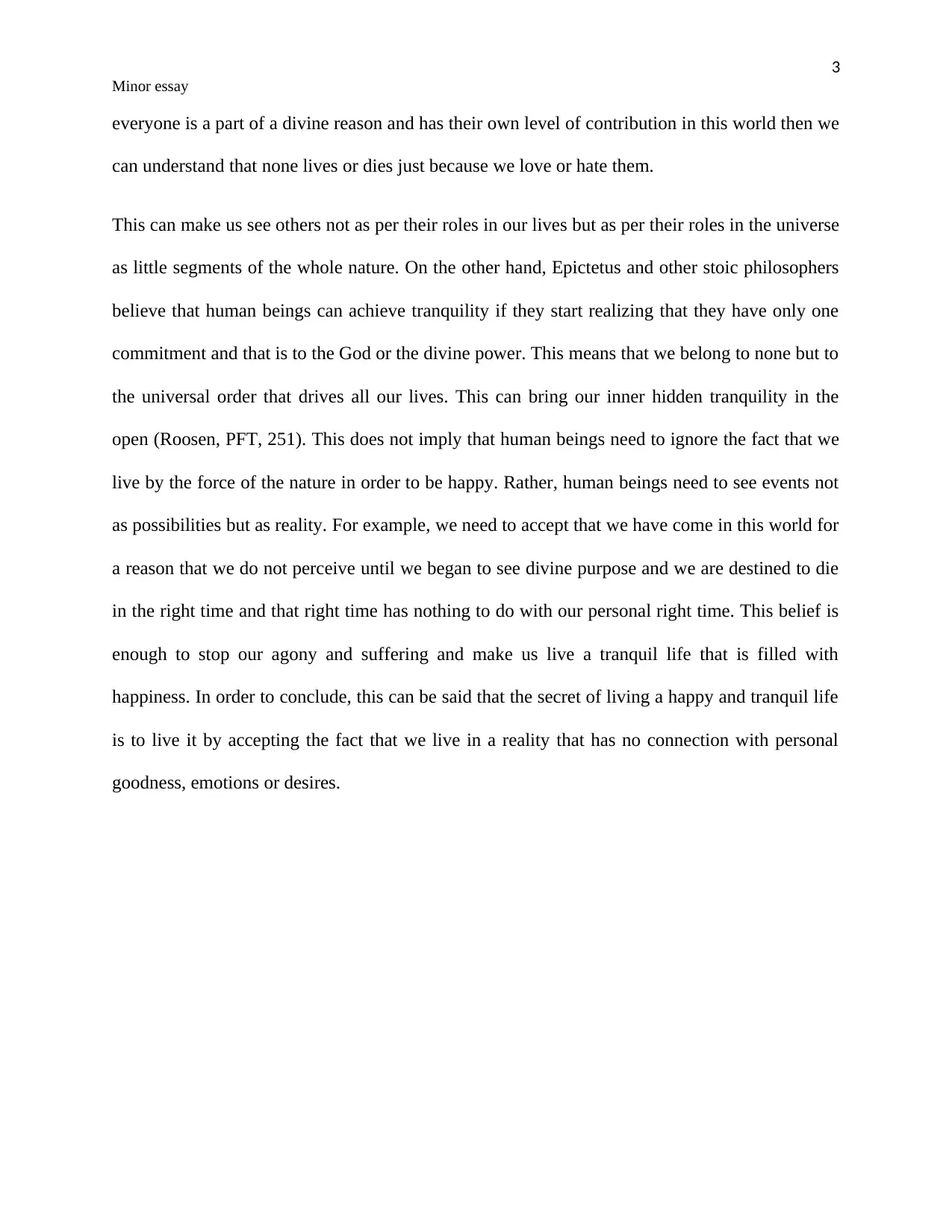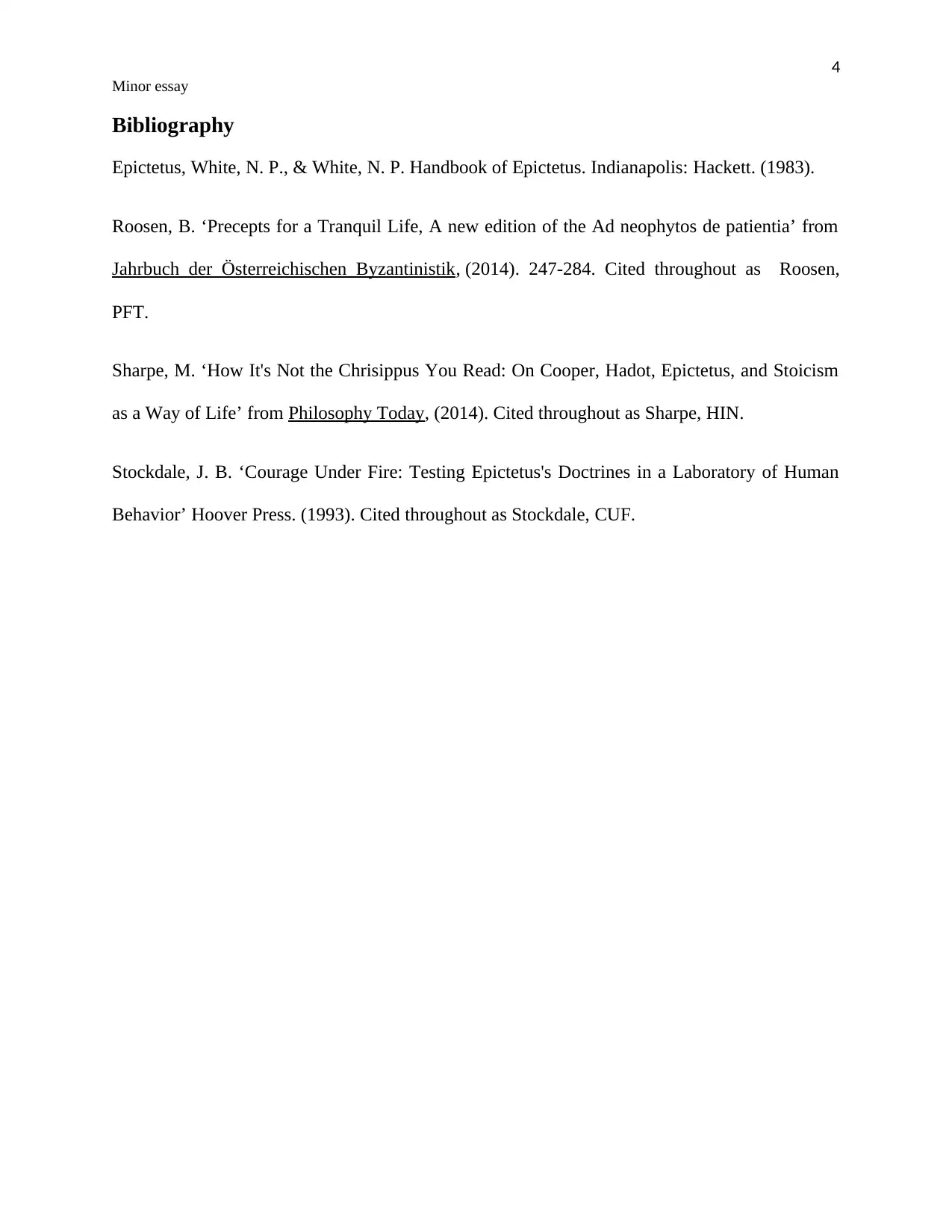Epictetus's Philosophy on Tranquility in 'The Encheiridion'
VerifiedAdded on 2023/04/21
|4
|1280
|73
Essay
AI Summary
This essay delves into Epictetus's perspective on tranquility, a key concept in Stoicism. It discusses Epictetus's teachings from 'The Encheiridion,' emphasizing the importance of aligning oneself with the natural order and accepting events as they happen, rather than clinging to personal expectations. The essay highlights Epictetus's belief in a divine power that governs all events, suggesting that human beings should focus on virtue and rationality to achieve inner peace. By understanding the difference between what we can and cannot control, individuals can overcome despair and embrace a tranquil life rooted in acceptance and a recognition of the interconnectedness of all things within the universe. The study concludes that true happiness lies in accepting reality and detaching from personal desires.

Running head: Minor essay
Tranquility is a vital concept in the outlook of stoicism that supports a different way of
perceiving things in the world. This is something that is beyond our personal cravings or our
aspirations as living beings. Epictetus is one of the initial flag bearers of stoicism who has
dictated about how one should live in this world in order to go beyond personal desires to reach a
different level of peace. Thus, this study has focused on what Epictetus wanted to convey when
he said that human beings need to stop matching the real events with their expectations and
rather to accept how things really are. On the other hand, this study has discussed Epictetus’s
views on tranquility and the ways to achieve that as per his book The Encheiridion.
It has been said that Epictetus was actually a slave who was lived a different life getting his
freedom from his master. He is famous for teaching stoic philosophical theories to his students
and gradually he has become one of the representatives of the stoic philosophy himself. He stated
that human beings need to see events not from the lens of expectation that they had regarding the
events but from a neutral perspective (Stockdale, CUF, 19). This is so because Epictetus believes
that we have a particular place in this world and we together make a physical totality that
depends on how all of our lives progresses as a whole. In addition, he thinks that everything that
happens is good for that physical totality and thus there is nothing real about personal happiness.
He thinks that because he believes in a divine source or power who he thinks drives us all. So, it
implies that no event is distinguished from another as all of them are parts of the big plan of that
divine power. On the other hand, he also says that human beings can see very little and as per
their perceptions they judge things based on their role in their individual lives. That’s why
human beings are unable to see the bigger purpose of living in this world together. According to
Epictetus, only thing that matters is our virtue. In other words, virtue is something that dictates
human beings to act rationally.
Tranquility is a vital concept in the outlook of stoicism that supports a different way of
perceiving things in the world. This is something that is beyond our personal cravings or our
aspirations as living beings. Epictetus is one of the initial flag bearers of stoicism who has
dictated about how one should live in this world in order to go beyond personal desires to reach a
different level of peace. Thus, this study has focused on what Epictetus wanted to convey when
he said that human beings need to stop matching the real events with their expectations and
rather to accept how things really are. On the other hand, this study has discussed Epictetus’s
views on tranquility and the ways to achieve that as per his book The Encheiridion.
It has been said that Epictetus was actually a slave who was lived a different life getting his
freedom from his master. He is famous for teaching stoic philosophical theories to his students
and gradually he has become one of the representatives of the stoic philosophy himself. He stated
that human beings need to see events not from the lens of expectation that they had regarding the
events but from a neutral perspective (Stockdale, CUF, 19). This is so because Epictetus believes
that we have a particular place in this world and we together make a physical totality that
depends on how all of our lives progresses as a whole. In addition, he thinks that everything that
happens is good for that physical totality and thus there is nothing real about personal happiness.
He thinks that because he believes in a divine source or power who he thinks drives us all. So, it
implies that no event is distinguished from another as all of them are parts of the big plan of that
divine power. On the other hand, he also says that human beings can see very little and as per
their perceptions they judge things based on their role in their individual lives. That’s why
human beings are unable to see the bigger purpose of living in this world together. According to
Epictetus, only thing that matters is our virtue. In other words, virtue is something that dictates
human beings to act rationally.
Paraphrase This Document
Need a fresh take? Get an instant paraphrase of this document with our AI Paraphraser

2
Minor essay
On the contrary, emotions make us perceive things from our personal bias. He also said that there
are certain things that we cannot control (Sharpe, HIN, 388). Thus, it is futile to expect
something while we know that everything happens as it is destined to happen. So what we can do
is to accept things as they are and try to see the hidden goodness in them. Thus, the contradiction
between personal reason and the reason of the divine can be balanced in order to live in
accordance with the divine plan. Thus, when he said that human beings should stop thinking that
events will happen as per their expectations, he meant that human beings need to break the glass
of personal emotions, expectations and desires in order to understands the reason of the worldly
nature we live in. in the pace of expecting things, he has dictated to be more welcoming to each
and every event because only this can make our lives a peaceful one. As mentioned earlier, we
cannot control what happens with us so it is better to be ready to face things as they are. Personal
desires, hopes and needs can only make our lives full of despair. On the other hand, the stoic
outlook can turn our lives into a more balanced one.
Tranquility is a higher level of existence that allows us to look things from a stoic perspective. In
other words, it is the state of living a calm life where we do not possess narrow outlooks on
happiness. According to Epictetus, happiness is dependent on one single principle that includes
the belief that human beings cannot control everything in their lives. On the contrary, there are
certain things that we can control. So it is very important to learn how to differentiate between
these two types of events. Only then an individual can achieve tranquility. For example, we
know that we are mortal and everyone that belongs to us will die one day including us. In spite of
this realization, we hold onto our loved ones and wish that none that we love dies ever. This
creates agony and suffering that continues till we live. Now, if we start realizing that each and
Minor essay
On the contrary, emotions make us perceive things from our personal bias. He also said that there
are certain things that we cannot control (Sharpe, HIN, 388). Thus, it is futile to expect
something while we know that everything happens as it is destined to happen. So what we can do
is to accept things as they are and try to see the hidden goodness in them. Thus, the contradiction
between personal reason and the reason of the divine can be balanced in order to live in
accordance with the divine plan. Thus, when he said that human beings should stop thinking that
events will happen as per their expectations, he meant that human beings need to break the glass
of personal emotions, expectations and desires in order to understands the reason of the worldly
nature we live in. in the pace of expecting things, he has dictated to be more welcoming to each
and every event because only this can make our lives a peaceful one. As mentioned earlier, we
cannot control what happens with us so it is better to be ready to face things as they are. Personal
desires, hopes and needs can only make our lives full of despair. On the other hand, the stoic
outlook can turn our lives into a more balanced one.
Tranquility is a higher level of existence that allows us to look things from a stoic perspective. In
other words, it is the state of living a calm life where we do not possess narrow outlooks on
happiness. According to Epictetus, happiness is dependent on one single principle that includes
the belief that human beings cannot control everything in their lives. On the contrary, there are
certain things that we can control. So it is very important to learn how to differentiate between
these two types of events. Only then an individual can achieve tranquility. For example, we
know that we are mortal and everyone that belongs to us will die one day including us. In spite of
this realization, we hold onto our loved ones and wish that none that we love dies ever. This
creates agony and suffering that continues till we live. Now, if we start realizing that each and

3
Minor essay
everyone is a part of a divine reason and has their own level of contribution in this world then we
can understand that none lives or dies just because we love or hate them.
This can make us see others not as per their roles in our lives but as per their roles in the universe
as little segments of the whole nature. On the other hand, Epictetus and other stoic philosophers
believe that human beings can achieve tranquility if they start realizing that they have only one
commitment and that is to the God or the divine power. This means that we belong to none but to
the universal order that drives all our lives. This can bring our inner hidden tranquility in the
open (Roosen, PFT, 251). This does not imply that human beings need to ignore the fact that we
live by the force of the nature in order to be happy. Rather, human beings need to see events not
as possibilities but as reality. For example, we need to accept that we have come in this world for
a reason that we do not perceive until we began to see divine purpose and we are destined to die
in the right time and that right time has nothing to do with our personal right time. This belief is
enough to stop our agony and suffering and make us live a tranquil life that is filled with
happiness. In order to conclude, this can be said that the secret of living a happy and tranquil life
is to live it by accepting the fact that we live in a reality that has no connection with personal
goodness, emotions or desires.
Minor essay
everyone is a part of a divine reason and has their own level of contribution in this world then we
can understand that none lives or dies just because we love or hate them.
This can make us see others not as per their roles in our lives but as per their roles in the universe
as little segments of the whole nature. On the other hand, Epictetus and other stoic philosophers
believe that human beings can achieve tranquility if they start realizing that they have only one
commitment and that is to the God or the divine power. This means that we belong to none but to
the universal order that drives all our lives. This can bring our inner hidden tranquility in the
open (Roosen, PFT, 251). This does not imply that human beings need to ignore the fact that we
live by the force of the nature in order to be happy. Rather, human beings need to see events not
as possibilities but as reality. For example, we need to accept that we have come in this world for
a reason that we do not perceive until we began to see divine purpose and we are destined to die
in the right time and that right time has nothing to do with our personal right time. This belief is
enough to stop our agony and suffering and make us live a tranquil life that is filled with
happiness. In order to conclude, this can be said that the secret of living a happy and tranquil life
is to live it by accepting the fact that we live in a reality that has no connection with personal
goodness, emotions or desires.
⊘ This is a preview!⊘
Do you want full access?
Subscribe today to unlock all pages.

Trusted by 1+ million students worldwide

4
Minor essay
Bibliography
Epictetus, White, N. P., & White, N. P. Handbook of Epictetus. Indianapolis: Hackett. (1983).
Roosen, B. ‘Precepts for a Tranquil Life, A new edition of the Ad neophytos de patientia’ from
Jahrbuch der Österreichischen Byzantinistik, (2014). 247-284. Cited throughout as Roosen,
PFT.
Sharpe, M. ‘How It's Not the Chrisippus You Read: On Cooper, Hadot, Epictetus, and Stoicism
as a Way of Life’ from Philosophy Today, (2014). Cited throughout as Sharpe, HIN.
Stockdale, J. B. ‘Courage Under Fire: Testing Epictetus's Doctrines in a Laboratory of Human
Behavior’ Hoover Press. (1993). Cited throughout as Stockdale, CUF.
Minor essay
Bibliography
Epictetus, White, N. P., & White, N. P. Handbook of Epictetus. Indianapolis: Hackett. (1983).
Roosen, B. ‘Precepts for a Tranquil Life, A new edition of the Ad neophytos de patientia’ from
Jahrbuch der Österreichischen Byzantinistik, (2014). 247-284. Cited throughout as Roosen,
PFT.
Sharpe, M. ‘How It's Not the Chrisippus You Read: On Cooper, Hadot, Epictetus, and Stoicism
as a Way of Life’ from Philosophy Today, (2014). Cited throughout as Sharpe, HIN.
Stockdale, J. B. ‘Courage Under Fire: Testing Epictetus's Doctrines in a Laboratory of Human
Behavior’ Hoover Press. (1993). Cited throughout as Stockdale, CUF.
1 out of 4
Related Documents
Your All-in-One AI-Powered Toolkit for Academic Success.
+13062052269
info@desklib.com
Available 24*7 on WhatsApp / Email
![[object Object]](/_next/static/media/star-bottom.7253800d.svg)
Unlock your academic potential
Copyright © 2020–2026 A2Z Services. All Rights Reserved. Developed and managed by ZUCOL.





